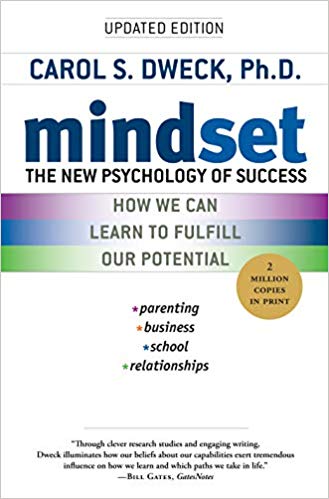

This article is an excerpt from the Shortform summary of "Mindset" by Carol Dweck. Shortform has the world's best summaries of books you should be reading.
Like this article? Sign up for a free trial here .
You’ve heard about Carol Dweck’s fixed and growth mindsets. What is your mindset?
We’ll cover the difference between a fixed mindset and a growth mindset so you can answer the question, What is your mindset?
What Is Your Mindset?
Here’s a summary of the two mindsets. Review it daily to remind yourself of the differences and stay in a growth mindset. First, What is your mindset? Then ask yourself what opportunities you have today for growth and how you’ll embrace them.
Fixed-Mindset
- Core belief: Ability is fixed.
- What happens:
- You feel a need to constantly prove yourself.
- You avoid challenges.
- You get defensive or give up.
- You see effort as pointless.
- You reject critical feedback.
- You feel threatened by others’ success.
- Result: You can’t learn or develop to your full potential.
Growth Mindset
- Core belief: Everyone can learn and grow.
- What happens:
- You focus on learning and growing.
- You welcome challenges.
- You persist in the face of obstacles.
- You see effort as a key to success.
- You welcome critical feedback.
- You learn from others’ success.
- Result: You continue to reach new levels of achievement.
What is your mindset? Although you may not be conscious of them, you have powerful beliefs that affect what you want and whether you get it. In Mindset, psychologist and researcher Carol S. Dweck argues that your attitudes about how fixed your abilities and intelligence are can determine the course of much of your life, starting as early as your preschool years.
You learn one of two mindsets from your parents, teachers, and coaches: that personal qualities such as intelligence are innate and unchangeable (a “fixed” mindset) or that you and others can change and grow (a “growth” mindset). This view shapes your personality and helps or hinders you from reaching your potential.
Your mindset shapes how you learn, cope with setbacks, advance in your career, and relate to others. So, what is your mindset? Here’s how the two mindsets compare.
Fixed mindset: When you have a fixed mindset, you believe your abilities are unchangeable. You were born with certain traits and a certain amount of intelligence and that’s that. Many people are trained in this mindset from an early age — for instance, by a teacher who believes your IQ determines everything: You’re either smart or you’re dumb; you can learn or you can’t. When you view your abilities as unchangeable, you feel you must constantly prove yourself. If people get a set amount of intelligence, you want to prove you have a lot, although you secretly worry you were shortchanged.
Growth mindset: When you have a growth mindset, you believe the abilities you’re born with are a starting point. You can get smarter and grow with hard work, persistence, and the right learning strategies. You have a passion for learning, welcome mistakes as opportunities to learn, and seek challenges so you can stretch.
The two different mindsets lead to different sets of thoughts and actions, and two different paths. They dictate people’s aspirations; how they see success, failure, and effort; and what that means in school, sports, work, and relationships. In answering, What is your mindset? think about your typical behaviors. Here are some ways the mindsets shape your life.
Success and Failure
In the fixed mindset world, success is about proving to yourself and others that you’re smart and talented. If you fail, it means you’re not smart or talented, therefore failure is intolerable. Failure is any type of setback: a bad grade, losing a competition, not getting the job or promotion you want, being rejected. Effort is a negative — if you need it, that means you’re not smart.
In the growth mindset world where you can change, success is about stretching yourself, learning, and improving. Failure is not seizing an opportunity to learn, not striving for what’s important to you, not reaching for your potential. Effort is a positive — it helps you get smarter and increase your abilities. What is your mindset? Do you view success as a means of proving your abilities or an opportunity to learn?
Perfection Versus Learning
For people with fixed mindsets, perfection is essential. To feel smart, they not only have to “get it” right away, they have to be perfect at it.
When researchers asked students from grade school to college age when they felt smart, fixed-mindset students said it was when they could do something quickly without making any mistakes. For growth-minded people, it wasn’t about perfection. They said they felt smart when they tried hard and made progress or were able to do something they couldn’t do before. Feeling smart was about learning. What is your mindset? When do you feel smartest?
Fixed Mindsets and Entitlement
A fixed-mindset person’s need to believe they’re smart can evolve into a sense of entitlement or specialness. Not only are they smart, they’re smarter or more talented than anyone else. Their need for validation is constant. The self-esteem movement bolsters this belief, for instance by encouraging you to remember your specialness with daily affirmations.
Tennis player John McEnroe is an example of both an entitled attitude and the pitfalls of a fixed mindset. He believed only in talent. Because he didn’t learn, he didn’t improve or grow as a player.
In contrast, basketball player Michael Jordan was growth-minded. He found public admiration embarrassing because he didn’t consider himself to be better than others — he’d developed his skills by working at them and always had room to improve. What is your mindset? Do you feel entitled and better than everyone else?
———End of Preview———

Like what you just read? Read the rest of the world's best summary of "Mindset" at Shortform . Learn the book's critical concepts in 20 minutes or less .
Here's what you'll find in our full Mindset summary :
- The difference between a growth and a fixed mindset
- How a fixed mindset keeps you back throughout your life: education, relationships, and career
- The 7 key ways to build a growth mindset for yourself






